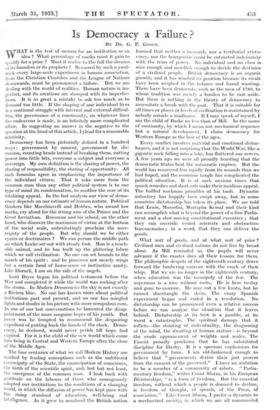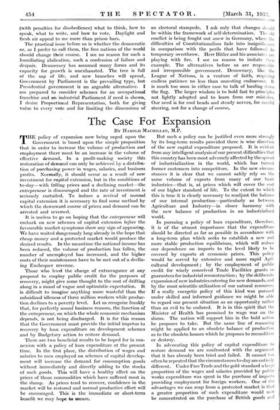Is Democracy a Failure ?
By Da. G. P. Gooch.
WHAT is the test of success for an institution or an idea ? What percentage of marks must it gain to qualify for a prize ? Must it realize to the full the dreams of its founders or its prophets ? Measured by such a yard- stick every large-scale experiment in human association, from the Christian Churches and the League of Nations downwards, must be pronounced a failure. But we are dealing with the world of realities. Human nature is im- perfect, and its creations are stamped with its imperfec- tions. It is as great a mistake to ask too much as to demand too little. If the shaping of our individual lives is a continual struggle with internal and external difficul- ties, the governance of a community, on whatever lines the endeavour is made, is an infinitely more complicated affair. In suggesting an answer in the negative to the question at the head of this article, I plead for a reasonable relativity.
Democracy has been pictorially defined in a hundred ways : government by consent, government by dis- cussion, counting heads instead of breaking them, cutting power into little bits, everyone a subject and everyone a sovereign. My own definition is the sharing of power, the sharing of responsibility, the sharing of opportunity. All such formulas agree in emphasizing the importance of the individual citizen. That it asks more from the common man than any other political system is to one type of mind its condemnation, to another the core of its vitalizing appeal. In the last analysis our view of demo- cracy depends on our estimate of human nature. Political thinkers like Macchiavelli and Hobbes, who award low marks, cry aloud for the strong arm of the Prince and the Great Leviathan. Rousseau and his school, on the other hand, who discover the maximum of virtue at the bottom of the social scale, unhesitatingly proclaim the sove- reignty of the people. But why should we be either cynics or doctrinaires ? We can pursue the middle path on which Locke set out with steady foot. Man is a teach- able animal, and he has built up the glittering fabric which we call civilization. No one can set bounds to the march of his spirit-: and he possesses not merely wings but a certain fund of horse-sense or instinctive sanity. Like Disraeli, I am on the side of the angels.
Lord Bryce began his political testament before the War and completed it while the world was rocking after the storm. In Modern Democracies the sky is not exactly a Riviera blue. No one has known more about political institutions past and present, and no one has mingled lights and shades in his picture with more scrupulous care. In one of our last conversations he lamented the disap- pointment of the more sanguine hopes of his youth. But never was he tempted to recommend the despairing expedient of putting back the hands of the clock. Demo- cracy, he declared, would never perish till hope had expired. For it is the child of the new world which came into being in Central and Western Europe after the close of the Middle Ages.
The four centuries of what we call Modern History are marked by leading conceptions such as the unfettered sovereignty of the State, the emancipation of conscience, the birth of the scientific spirit, and, last but not least, the emergence of the common man. I look back with gratitude on the labours of those who courageously adapted our institutions to the conditions of a changing world, in which the diffusion of power has kept pace with the rising standard of education, well-being and intelligence. As it grew to manhood the British nation learned that neither a monarch, nor a territorial aristo- cracy, nor the bourgeoisie could be entrusted indefinitely with the reins of power. No individual and no class is wise enough and unselfish enough to decide the destinies of a civilized people. British democracy is an organic growth, and it has reached its position because its rivals have been weighed in the balance and found wanting. There have been democrats, such as the men of 1789, to whom tradition was merely a burden to be cast aside.
But there is nothing in the theory of democracy to necessitate a break with the past. That it is suitable for all times or places or levels of civilization is maintained by nobody outside a madhouse. If I may speak of myself, I am the child of Burke no less than of Mill. In the name of continuity, by which I mean not mechanical sequence but a natural development, I claim democracy for Western Europe as the heir of the ages.
Every conflict involves material and emotional distur- bances, and it is not surprising that the World War, like a ' gigantic rock falling into a lake, has 'fluttered our nerves.
• A few years ago we were all 'proudly boasting that the democratic States beat the autocratic empires. But the world has recovered less rapidly from its wounds than we had hoped, and the economic tangle has complicated the political situation. It is at such anxious times that quack remedies and short cuts make their insidious appeal. The baffled workman grumbles at his tools. Dynastic autocracy has happily been swept away, but in some countries dictatorship has taken its place. We are told that Lenin, Mussolini, Mustapha Kemal and their kind can accomplish what is beyond the power of a free Parlia- ment and a slow-moving constitutional executive ; that they can override vested interests and obstructive bureaucracies ; in a word, that they can deliver the goods.
What sort of goods, and at what sort of price ? Civilized men and civilized nations do not live by bread alone. As Mill reminded us, the pupils will never advance if the master does all their lessons for them. The philosophic despots of the eighteenth century drove forward the lumbering. caravan with the crack of their whip. But we arc no longer in the eighteenth century, when education was the monopoly of the few. The superman is a tree without roots. He is here to-day and gone to-morrow. He may cut a few knots, but he cannot disentangle the skein. The crazy Spanish experiment began and ended in a revolution. No dictatorship can be pronounced even a relative success before we can analyse the situation that it leaves behind. Dictatorship at its best is a gamble, at its worst a catastrophe. The spiritual damage that it inflicts—the stunting of individuality, the dragooning of the mind, the dwarfing of human stature—is beyond the crude appraisement of weights and scales. The Fascist proudly proclaims that he has substituted discipline for liberty. It is a specious euphemism for government by force. I am old-fashioned enough to believe that " governments derive their just powers from the consent of the governed." I have no ambition .to be a member of a community of robots. " Parlia- mentary freedom," writes Count Sforza, in his European Dictatorships, " is a form of freedom. But the essential freedom, without which a people is doomed to decline, is freedom of thought, of speech, of the Press, of association." Like Count Sforza, I prefer a dynamic to a mechanized society, in which we are all commanded (with penalties for disobedience) what to think, how .to speak, what to write, and how to vote. Daylight and fresh air appeal to me more than prison bars.
The praetical issue before us is whether the democratic or, as I prefer to call them, the free nations of the world should change their course. I see no reason for such a humiliating abdication, such a confession of failure and despair. Democracy has assumed many forms and its capacity for growth is unexhausted. The tree is full of the sap of life, and new branches will sprout. Government by Parliament is the prevailing type, but Presidential government is an arguable alternative. I am prepared to consider schemes for an occupational franchise and an industrial Parliament if need is shown, I desire Proportional Representation, both for giving value to every vote and for limiting the dimensions of an electoral stampede, I ask only that changes should be within the framework of self-determination. The old conflict is being fought out anew in Germany, where the difficulties of Constitutionalism fade into insignificance in comparison with the perils that have followed its temporary overthrow. Herr Hitler and his associates are playing with fire. I see no reason to imitate their example. The alternatives before us are' respon,,ible and irresponsible government. Democracy, like the League of Nations, is a venture of faith, requiring endless patience no less than unresting endeavour. It is much too soon in either case to talk of hauling down the flag. The larger wisdom is to hold fast to principles not lightly adopted and to learn from our mistakes. Our need is for cool heads and steady nerves, for careful steering, not for a change of course,









































 Previous page
Previous page